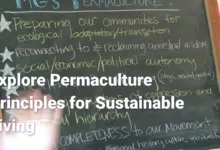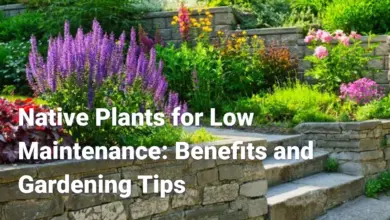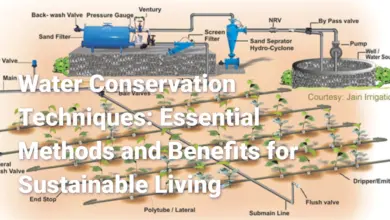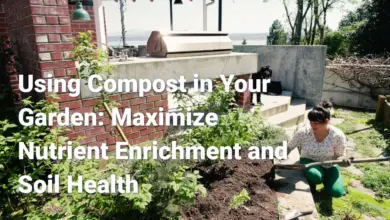Benefits of organic gardening
Organic gardening offers a symphony of advantages, painting a vibrant picture of well-being and sustainability. It serves as a beacon of hope for a generation yearning for a healthier lifestyle amidst growing environmental concerns. Imagine a garden where the vibrancy of nature thrives, unburdened by the toxic shroud of synthetic chemicals. Here, each plant is not just a botanical specimen but a vital component of a resilient ecosystem. The flavors of the produce grown in these gardens are unmatched, rich in nutrients, and free from the invisible traces of harmful chemicals. Beyond the ecological benefits, organic gardening is a journey of psychological wellness and community building, where gardening becomes a therapeutic exercise, reducing stress and fostering social bonds. In essence, this practice is more than soil and seeds; it is an investment in health, environment, and community, promising a legacy of sustainability for future generations.
Environmental benefits of organic gardening
Engaging in organic gardening is like cradling Mother Earth in gentle hands, nurturing her with respect and foresight. Environmental benefits abound, with organic gardening playing a crucial role in reducing pollution and promoting biodiversity. The methods involved echo the rhythms of nature itself employing compost, mulch, and crop rotation to reinforce an ecosystem’s vitality. As we delve into specific advantages like pollution reduction, biodiversity preservation, and erosion control, the overarching theme is tethered to sustainability, echoing the commitment of organic practices that champion ecological balance, holistic health, and the rejuvenation of our natural surroundings.
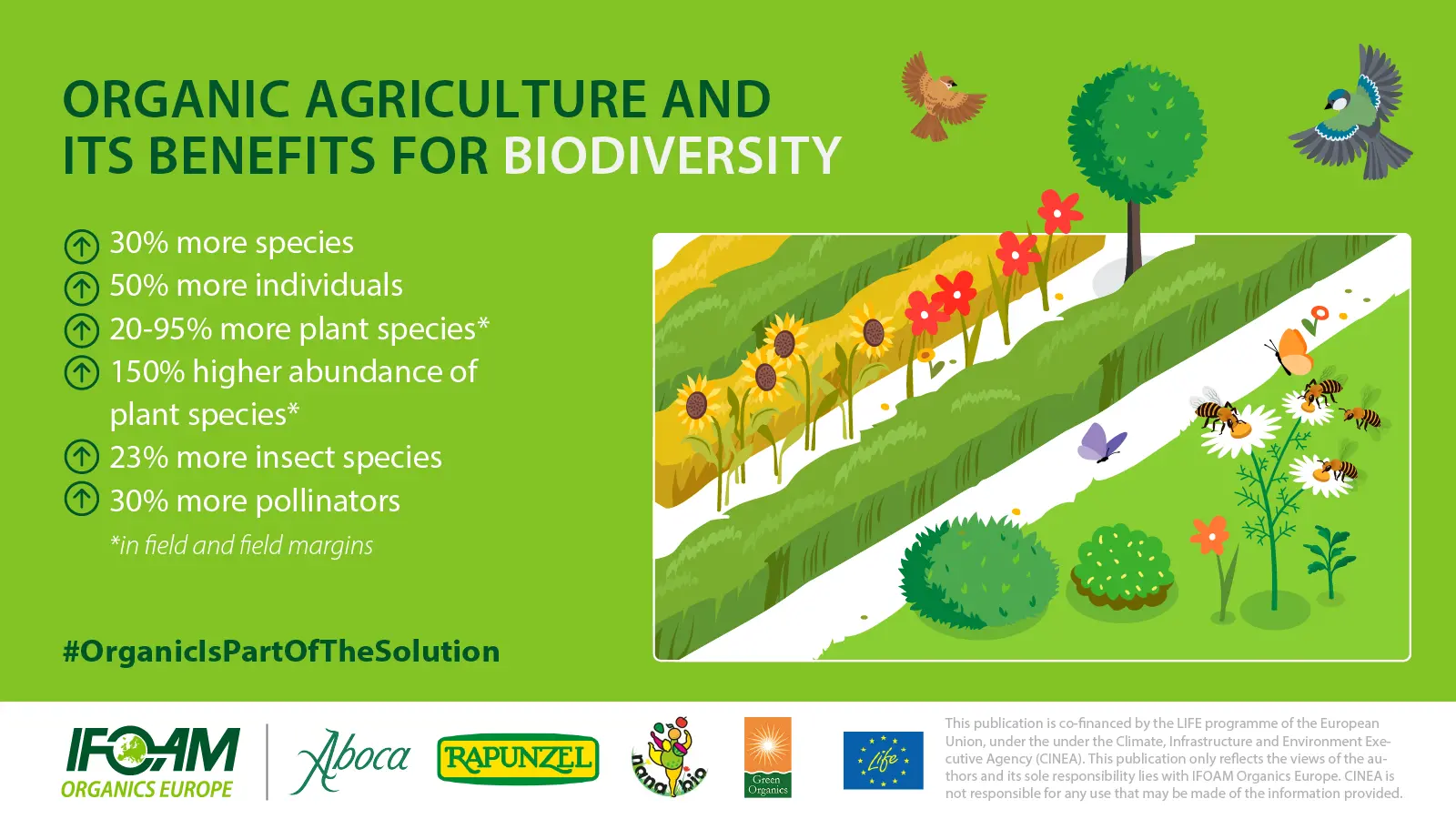
Reduction of pollution
In the world of organic gardening, the art of minimizing pollution unfolds in ways both subtle and profound. Unlike conventional gardening that often befriends synthetic chemicals, organic methods cleanse the environment, echoing the harmonious dance of nature. Synthetic pesticides and fertilizers are the culprits of water pollution, often leaching into nearby water bodies, disrupting aquatic life. Organic gardening, by eschewing these substances, acts as a guardian of waterways, protecting them from contamination.
Imagine each plant in an organic garden as a sentinel, guarding the purity of water resources. They engage in a symbiotic relationship with the soil, sustained by natural fertilizers like compost and green manure. Composting, a beloved friend of organic enthusiasts, is not just about recycling kitchen waste; it’s about transforming it into black gold that enriches the soil and curbs pollution. This virtuous cycle ensures that nutrients run deep into the earth, nurturing plant roots while keeping pollutants at bay.
The benefits of organic gardening extend their green tendrils into the air as well. By reducing reliance on fossil fuel-derived fertilizers, organic gardening contributes to a lower carbon footprint. Mulching, another eco-conscious practice, conserves water and suppresses weeds without the use of harmful herbicides, creating a healthier microclimate for all garden dwellers.
- Natural Methods Employed:
- Composting
- Mulching
- Crop rotation
The effects of these practices ripple through the environment, acting as a balm to tired ecosystems. The soil becomes more than just a growing medium; it becomes a sponge, absorbing potential toxins and cleansing the environment through natural means. As the plants grow, they purify the air, and as water flows across organic fields, it carries with it the promise of renewal, untouched by the grimy fingerprints of industry.
Organic gardening is thus not merely a method but a philosophy of reducing pollution through mindful practices, reconnecting humanity with the natural rhythms of the earth, and safeguarding our planet for future generations.
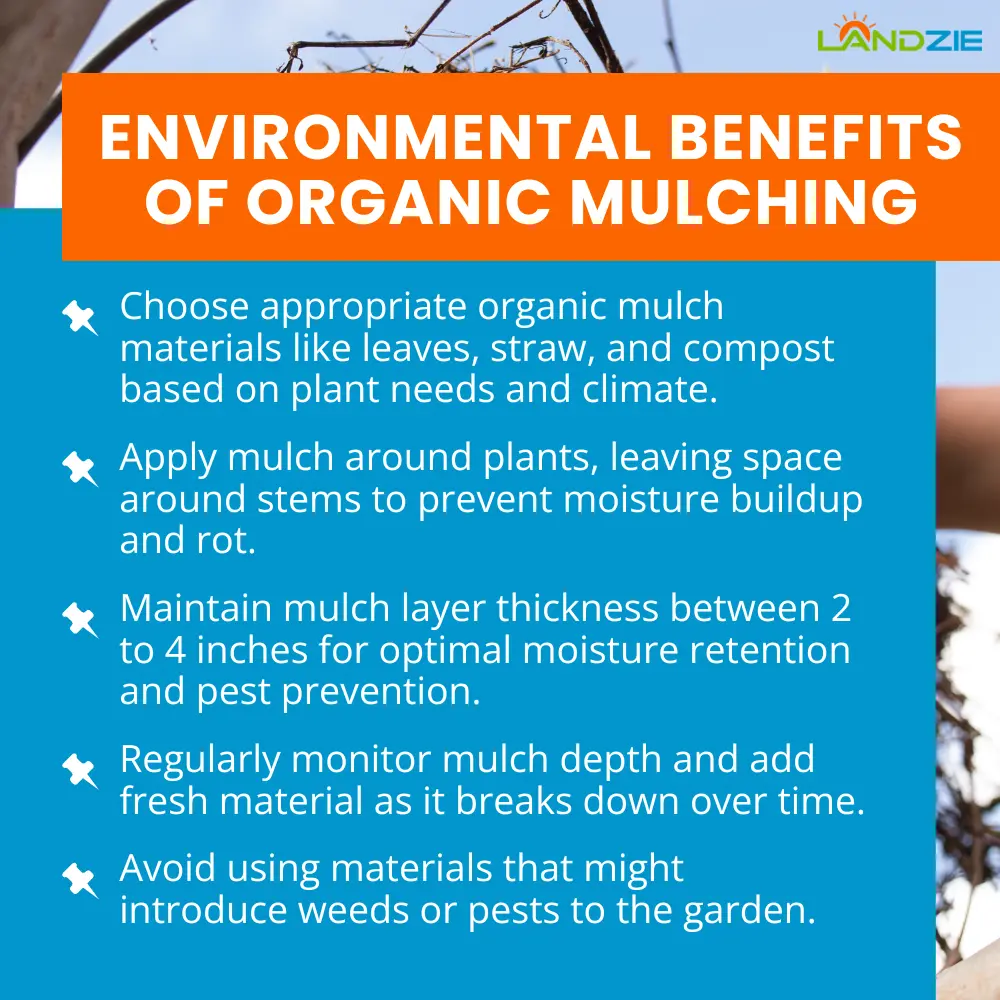
Preservation of biodiversity
The stage set by organic gardening is one where biodiversity takes the spotlight, flourishing with an array of colors, forms, and life. It’s a refuge where life thrives across all scales, from the microscopic fungi in the soil to the majestic butterflies fluttering amongst the blooms. Organic gardening embraces biodiversity as its heartbeat, understanding that each organism, no matter how small, plays a crucial reciprocal role in maintaining the balance of life.
Synthetic chemicals, despite their effectiveness, serve as a double-edged sword, often obliterating the delicate balance of ecosystems. In contrast, organic gardens attract pollinators like bees and butterflies, the unsung heroes of plant reproduction. Their presence is not merely ornamental; it’s vital to the successful fruition of the garden. The gentle hum of honeybees amidst flowers speaks more eloquently than words, highlighting the essence of life that organic methods nurture.
An organic garden is akin to a vast, interconnected web of life. By fostering a variety of plants, it invites a plethora of insects and animals creating a dynamic tapestry of interactions. The absence of pesticides is a clarion call to beneficial insects, who contribute to natural pest control, diminishing the need for chemical interventions. The soil, in turn, becomes a thriving cosmos of microorganisms, bustling with earthworms and fungi that facilitate nutrient cycling and soil health.
- Biodiverse Practices:
- Companion planting
- Natural pest control
- Habitat creation for pollinators
Preserving biodiversity through organic gardening is not just an environmental act; it’s a legacy. As diverse plants bloom, they mirror the strength and resilience inherent in diversity itself a garden that remains ever adaptive and robust against changing conditions and challenges. In this intricate dance, each species has a part to play, underlining the intricate connections that sustain life.
The environment, when painted with the brushstrokes of organic practices, becomes a mosaic of harmony, each element fulfilling a role that enhances the whole. By cultivating this biodiversity, organic gardens not only reinvent but preserve the world for generations yet unborn, ensuring that the wild symphony of the natural world continues to play on.
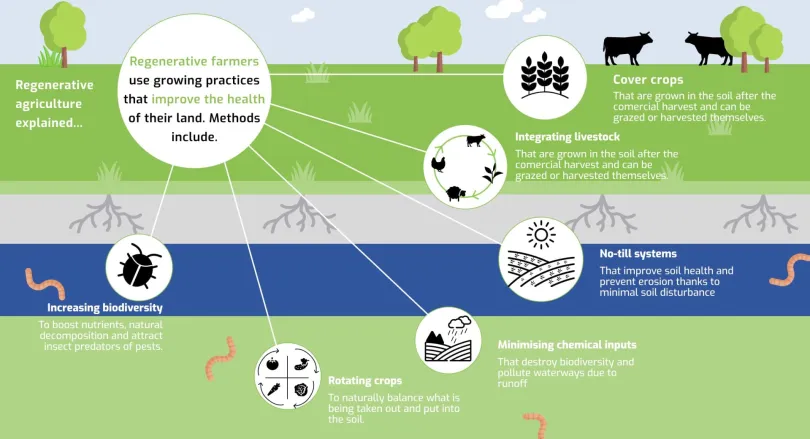
Erosion control and soil health
In the realm of organic gardening, soil is not just dirt; it’s the vibrantly beating heart of cultivation, the fortress against erosion that safeguards rich, fertile lands. Through the nurturing hands of organic practices, soil health is paramount, offering an armor against the potentially devastating impacts of erosion.
Erosion control becomes a harmonious dance in this setting, drawing upon nature’s innate systems. Techniques like cover cropping and mulching shield the soil from the harsh forces of wind and rain, their quiet protection akin to a parent’s care. These plants serve dual purposes providing nutrients to the soil while anchoring it firmly against erosive elements.
Healthy soil is a thriving community of life, a complex matrix where organisms like earthworms and microflora flourish. Organic gardening underscores the importance of this ecosystem, recognizing that enhanced soil structure boosts water retention and supports robust plant growth. Such soil acts as a natural sponge, preserving moisture and reducing runoff, mirroring nature’s method of self-preservation.
- Key Practices in Erosion Control:
- Cover cropping: plants that are grown not to be harvested but to protect and enrich the soil.
- Mulching: adding a layer of organic material on top of the soil to retain moisture and improve fertility.
- Use of organic fertilizers: improving soil aggregation and nutrient availability.
This paradigm of gardening cultivates not only plants but the soil itself. The soil’s transformation under organic practices is magical: from an inert medium to a living habitat. The balance within ensures that nutrients are cycled efficiently and that plants grow with vigor and resilience, prepared to withstand both harsh climates and the test of time.
Gardens that prioritize erosion control have soil that teems with life, each clod rich with nutrients that would otherwise be lost. By championing these practices, organic gardening becomes a bulwark against erosion, conserving precious soil our planet’s lifeblood. Through these efforts, gardeners craft a narrative of heritage and sustainability, ensuring that the bounty of fertile soil is protected and enriched for future generations to cultivate and enjoy.
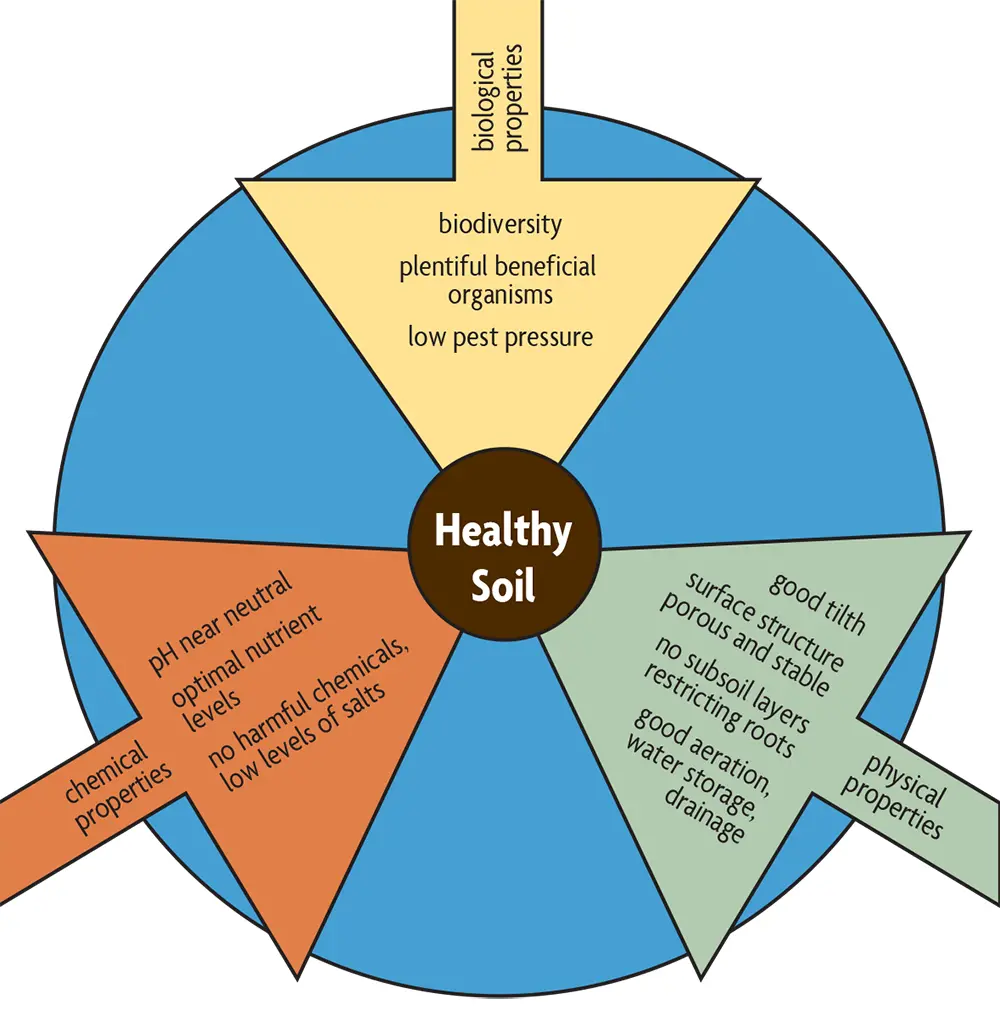
Health benefits of organic gardening
The liveliness of an organic garden extends beyond its visible beauty. Health benefits notably emerge from this practice, impacting both physical and mental dimensions. While the previous sections unraveled the ecological advantages, the narrative spins into personal health, delighting both taste buds and well-being with its bounty. Embracing organic gardening means embracing a lifestyle enriched with nutrient-dense produce free from harmful chemicals. This nurturing practice not only complements the ecological benefits but embarks on a journey of wellness that cherishes the individual, bridging the natural world with the personal pursuit of health and vitality.
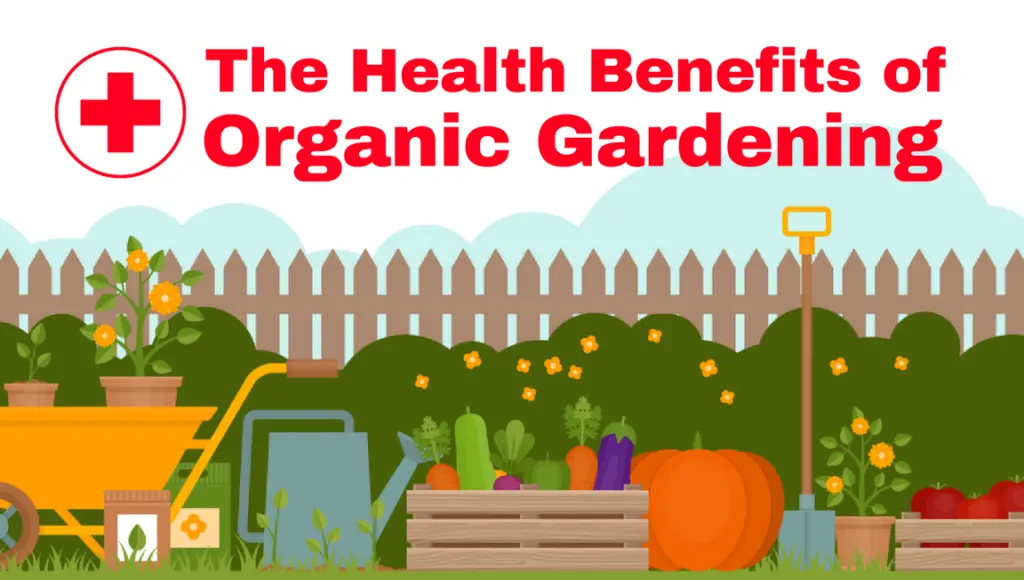
Nutritional advantages of organic produce
When considering the health benefits of organic gardening, the nutritional advantages of its produce stand out vividly. There is something innately satisfying about biting into a sun-ripened tomato or vibrant apple, not just for their flavors but for their dense nutrient profiles. Organic fruits and vegetables often boast higher levels of essential nutrients, including vitamins, minerals, and antioxidants, than conventionally grown produce. This nutritional richness stems from the garden’s intrinsic practices, where everything is cultivated in harmony with nature.
Antioxidants are a highlight of organic produce, offering more than just vibrant colors. These compounds are warriors against oxidative stress, a contributor to aging and chronic diseases. Scientific studies suggest that organically grown foods may contain up to 30% more antioxidants than their non-organic counterparts. The presence of polyphenols, essential for heart health and reducing inflammation, is more robust in produce grown without synthetic interventions.
The nutrient uptake from richer soil directly correlates with human health. Organic gardening, with its attention to soil health, enhances the availability of micronutrients to plants, resulting in food that is as rich in nutritional value as it is in flavor. This means:
- Higher Vitamin C levels
- Increased iron and magnesium content
- Richer polyphenolic profiles
Yet, beyond charts and studies, there’s a simpler truth to organic produce a taste that brings joy. The palette of flavors in organic fruits and vegetables is more diverse and pronounced, often reminding us of the authentic taste profiles lost in mass agriculture. In this light, organic gardening doesn’t just offer nutrition; it revives the soul’s connection to food and tradition.
Thus, organic gardening embraces a commitment to health, offering a renaissance of taste and nutrition that enhances our diets and, by extension, our lives. It’s about more than visible bounty; it’s about nourishing the body deeply, imbuing our meals with the potent energy and wellness that organic cultivation brings to the table.
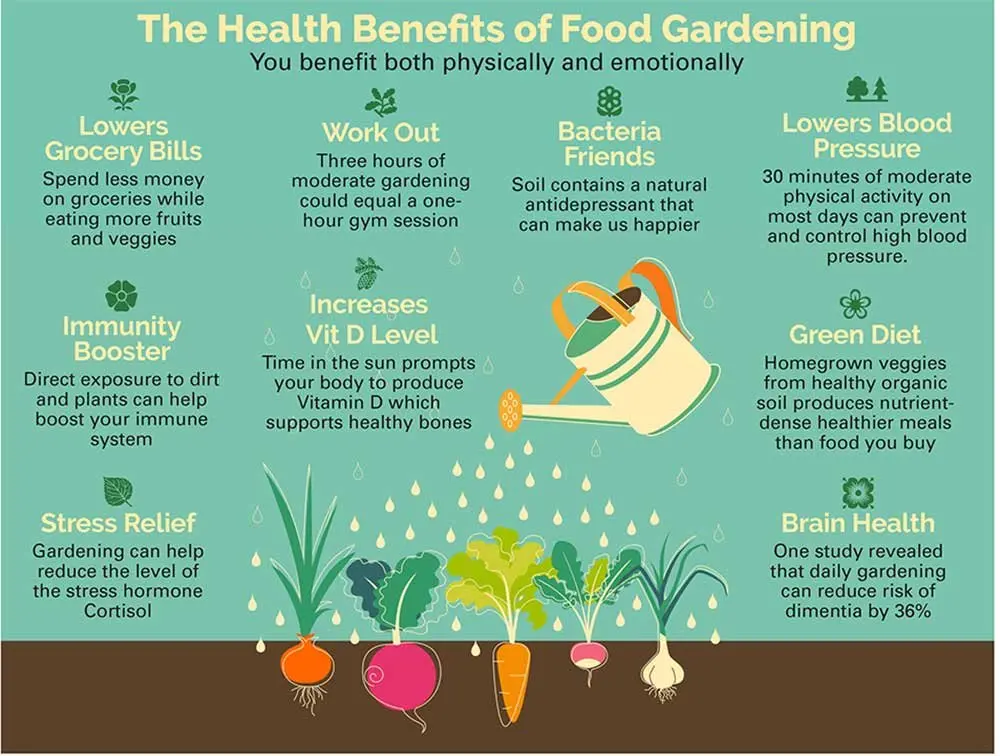
Reduced exposure to harmful chemicals
One cannot overstate the health benefits tied to organic gardening, especially when considering the reduced exposure to harmful chemicals. The absence of synthetic pesticides, herbicides, and fertilizers in organic practices eliminates a significant health risk associated with conventional agricultural methods. These chemicals, while designed to boost productivity, pose serious health hazards, especially when residues linger on the produce.
Organic gardening eliminates these dangers by opting for nature’s toolkit companion planting, natural pest predators, and organic soil amendments ensure plants thrive without chemical crutches. The result is produce that carries minimal chemical residues, significantly reducing exposure to potentially carcinogenic substances. Studies have shown that regular consumption of organic produce may lead to a decrease in pesticide intake by 30–50 percent. This reduction is crucial in mitigating risks associated with chronic illnesses, such as Parkinson’s disease and various cancers.
The organic approach to pest and disease management is rooted in prevention and ecosystem balance rather than crisis response, which conventional methods often rely upon. This holistic view nurtures an environment where every organism, from microbes to insects, has its place and purpose. Gardeners employ:
- Natural pest deterrents like neem oil and diatomaceous earth
- Organic fertilizers such as bone meal and compost
- Biologicals for enhancing plant immunity
The quest for chemical-free food involves more than fear of residues; it’s about cultivating a relationship with the natural world. Organic gardening gives individuals the power to reclaim the authenticity of their food supply, providing security and wellness that extends far beyond the garden gate.
This reduction in harmful chemical exposure fosters a ripple effect, engendering health-conscious communities and bolstering public health. A garden devoid of chemical inputs is a sanctuary of wellness, where plants and humans alike can flourish, nurtured by nature’s pure and untainted gifts.
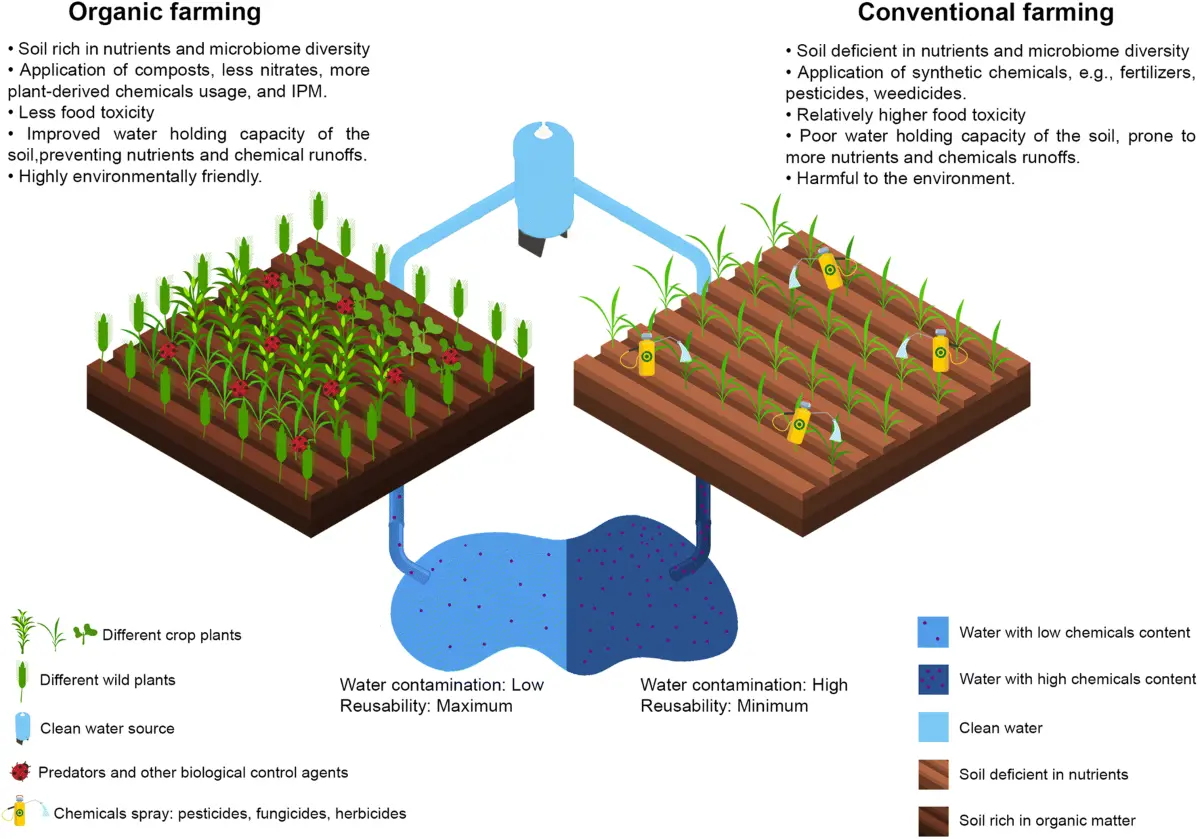
Economic benefits of organic gardening
The economic benefits intertwined with organic gardening reveal another layer of its appeal, echoing the sentiments shared about health advantages. While organic gardening stimulates personal well-being, it also opens avenues for financial prudence and community prosperity. By cultivating food at home, individuals harness the power to save on grocery expenses while potentially boosting local economies. It becomes an economic engine supporting not only individual households but also invigorating broader community ecosystems, forging a sustainable, financially advantageous path rooted in organic principles.

Cost savings from home-grown produce
The allure of organic gardening is not only about the freshness and flavor but also the marked cost savings associated with growing your own produce. As food prices soar and environmental concerns mount, many individuals find solace and financial reprieve in home gardens. Embracing organic gardening offers a tangible way to reduce grocery bills and increase self-sufficiency a crucial step in times where economic against oscillates unpredictably.
The cost savings are significant: a garden teeming with fresh vegetables and fruits can dramatically cut down on trips to the grocery store. According to research, a well-maintained home garden can yield produce worth hundreds of dollars annually. This transformation from consumer to producer represents an empowering shift, where planting a seed symbolizes not just growth in the garden, but growth in savings as well.
- Savings Breakdown:
- Initial investment: seeds, soil amendments, tools
- Recurring costs: water, organic fertilizers (such as compost)
- Return: significant reduction in the need to purchase expensive organic produce
Moreover, organic home gardening naturally circumvents the premium prices often associated with organic produce in stores. With the groundwork of nutrient-rich soil and natural pest deterrents in place, each harvest reflects a savvy, eco-friendly financial decision. The economic advantages extend beyond personal savings, profoundly impacting the wider community.
In times of financial prudence, the tangible and intangible benefits of home-grown produce resonate with those pursuing sustainable lifestyles. By cutting food costs and cultivating a deeper connection with the natural world, organic gardening empowers individuals to contribute positively to their household and, in broader strokes, to society as a whole.
Home gardening echoes the empowerment narrative a personal choice that strengthens resilience, facilitates economic gain, and ensures that wealth is counted not just in currency but in the abundance of nature’s rich bounty.

The impact of organic gardening on local economies
Organic gardening, with its emphasis on community engagement, provides fertile grounds for economic enrichment at a local level. The ripple effects of such practices extend far beyond the confines of personal gardens, fostering economic growth, networking opportunities, and sustainable practices within neighborhoods. Local economies become enriched not just through the sale of surplus produce but by promoting jobs, skills exchange, and business opportunities in an eco-friendly framework.
Community gardens are a testament to this impact, transforming underutilized urban spaces into vibrant, productive hubs. These gardens not only supply fresh produce but serve as incubators for eco-entrepreneurship, allowing residents to sell their surplus at local farmers’ markets. The collaborative nature of these projects means shared resources, reduced costs, and increased access to fresh food, creating a more equitable economy with broad-reaching social benefits.
- Economic Boosts:
- Increased property values due to community aesthetics and cleaner environments
- Job creation in urban agriculture, landscape management, and organic farming practices
- Educational opportunities in sustainable gardening
These gardening initiatives also reinforce the local food system, reducing reliance on imports and lowering carbon footprints associated with food travel. By aligning with eco-friendly values, organic gardening endeavors are instrumental in developing resilient, self-sufficient communities, fostering economic stability in diverse and meaningful ways.
In an era where the buzzword “sustainability” is on everyone’s lips, organic gardening exemplifies consumer and community synergy, cultivating spaces that are not only environmentally sound but economically viable. Such practices champion localities where neighbors collaborate, share knowledge, and foster a culture of mutual reliance, transforming the economy from a competitive market to a compassionate ecosystem that repurposes wealth for the collective good.
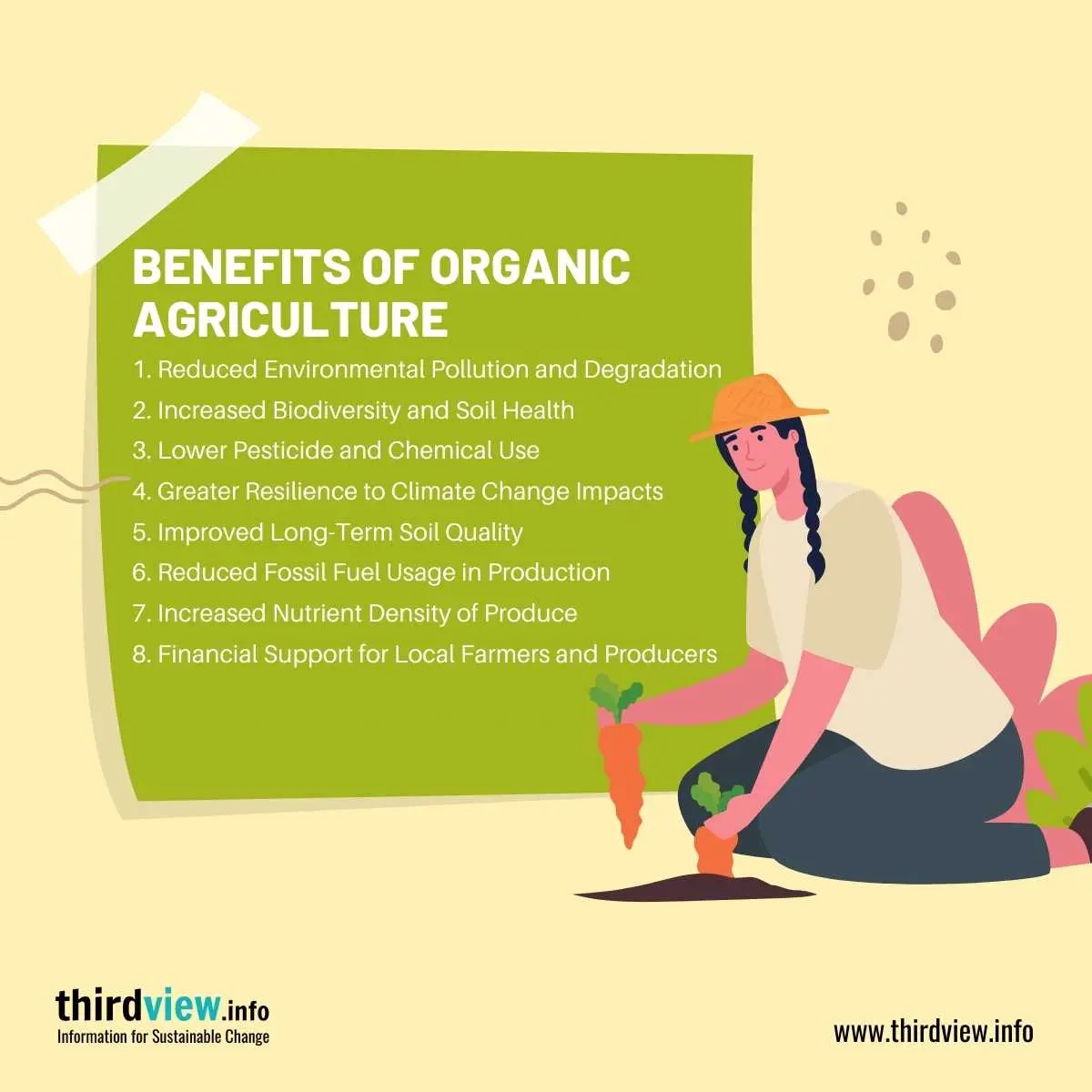
Psychological and social benefits of organic gardening
The connection between gardening and psychological well-being forms a robust framework for emotional health and social interaction. Organic gardening is a gateway to more than just economic and environmental benefits; it enriches the human spirit, providing solace and fostering connections among individuals. This practice is not merely about growing plants but nurturing relationships and mental health, weaving the gardener into the ecosystem of community, where each person plays an integral role in promoting social harmony, life satisfaction, and overall well-being.

Stress reduction and mental health improvement
Organic gardening’s tender touch on mental health is akin to a calming breeze settling a turbulent sea. This practice serves as a sanctuary for those seeking respite from the daily grind, offering therapeutic benefits that span both mental and emotional well-being. As hands dive into rich, nurturing soil, stress dissipates, replaced by mindfulness and serenity.
The physical act of gardening itself is a gentle workout for the mind and body. Tasks like planting, weeding, and watering engender a rhythm of peacefulness, reducing cortisol levels and fostering mental clarity. The activity is inherently meditative, allowing for a focus on the moment a practice of mindfulness hailed for reducing anxiety and depression.
- Mental Health Perks:
- Improves mood through sunlight exposure and physical activity
- Facilitates mindfulness, reducing symptoms of anxiety
- Encourages a sense of accomplishment and purpose
In a world where screens bombard us and cities buzz with urgency, gardening offers a return to natural simplicity. The act of nurturing plants instills a sense of purpose, providing emotional fulfillment and satisfaction as gardens flourish under careful tending. Watching plants thrive under one’s care reinforces self-esteem and boosts confidence, critical components of mental resilience.
Furthermore, the medicinal practice of gardening reveals nature’s soothing powers as it fosters community connection. Organic gardening invites individuals into communal spaces, where friendships blossom as surely as the flowers a testament that the path to psychological wellness is a collective journey.
Gardening, with its gentle cadence, becomes a balm for the mind, fostering wellness through its quiet grace and organic charm. By attuning to nature’s cycles, one nurtures not only the land but the soul, bringing harmony to both.

Community building through gardening
The sociocultural impact of organic gardening can be likened to the weaving of a rich tapestry each thread representing a person, each interaction a vibrant stitch. Community gardening decentralizes the solitary aspect of individual toil, forging bonds and nurturing friendships within neighborhoods, urban areas, and local districts. By fostering common ground both literally and figuratively, gardening yields significant social dividends.
Community gardens are arenas of cooperation and learning. Through shared knowledge, resources, and responsibilities, they become nexuses of community engagement and stewardship. They bring together diverse individuals regardless of age or background, promoting inclusivity and breaking down social barriers.
- Social Benefits:
- Enhances social cohesion as people work towards shared goals
- Fosters cultural exchange and inter-generational learning
- Cultivates a sense of belonging and community identity
These spaces serve as green sanctuaries in urban landscapes, enhancing urban aesthetics and offering havens for biodiversity while galvanizing public interest in sustainable living. As plants grow, so too do the relationships among gardeners, grounded by the shared commitment to nurture and foster a thriving community.
Furthermore, the shift towards community-supported agriculture reflects this collaborative spirit. Local schools, organizations, and businesses often integrate gardening into their infrastructure, promoting healthy eating habits while reiterating the garden’s role as an educational tool for sustainability and ecology.
Through gardening, a commonality emerges that transcends divisive lines. It’s a testament to the power of collective action, embodying a vision of cooperation where the benefits of healing land and strengthening bonds are celebrated. This way, organic gardening extends beyond the act of cultivation it becomes the rootstock upon which connected, caring communities grow and flourish.
Comparison of organic gardening vs. conventional gardening
The detailed comparison between organic gardening and conventional gardening births a tapestry of discernments where psychological and social benefits interlace with broader ecological and economic considerations. This juxtaposition aligns with themes explored in mental and community wellness, demonstrating the profound ripple effects each gardening philosophy has on people and planet. The chosen path of cultivation is not only about yields and profits; it’s a choice with social, environmental, and lifestyle implications, drawing lines between practices defined by harmony versus expediency.
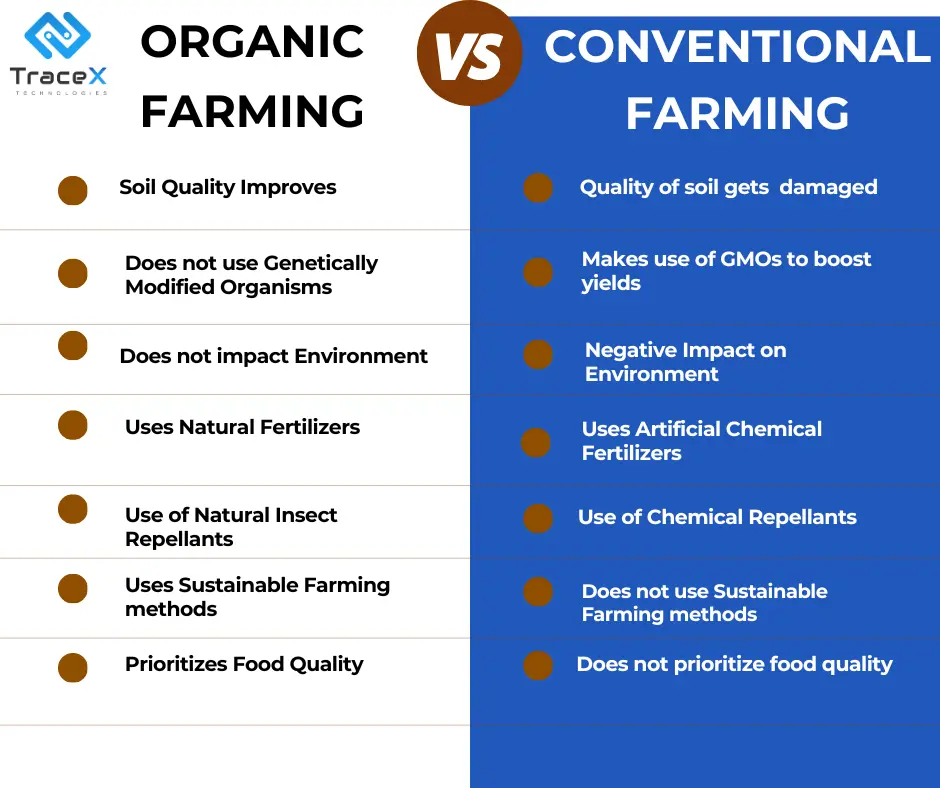
Ecological impact comparison
The ecological impacts of organic versus conventional gardening unfold as a tale of two approaches. Both seek bountiful harvests, yet their methods diverge, leaving distinct footprints on the environment. Organic gardening is akin to nature’s counselor, advocating sustainability, biodiversity, and soil health, while conventional practices often prioritize productivity and yield, sometimes to the detriment of ecological harmony.
Organic gardening employs methods that enhance biodiversity and natural resource conservation. These practices promote a flourishing web of life below and above ground, providing habitats for beneficial insects and microbes alike. In contrast, conventional gardening’s reliance on synthetic fertilizers and pesticides often disrupts these natural balances, leading to soil depletion and potential water contamination.
Ecological Approaches:
- Organic: emphasizes crop rotation, composting, natural pest control
- Conventional: focuses on chemical fertilizers, monocropping, synthetic pest deterrents
While the initial yields of conventional practices may appear higher, their long-term effects reveal a different story. Degradation of soil health and reduction of biodiversity lead to diminishing returns, posing risks to sustainable growth. Conversely, organic gardening’s rich tapestry of diverse flora enhances soil structure and fertility, essentially future-proofing against climate variability.
The ripples of these practices are palpable: organic methods create a self-sustaining ecosystem that fortifies itself through biodiversity, while conventional systems may falter under environmental stressors, reliant on external inputs for stability. In this comparison, organic gardening emerges as the environmental steward, ensuring the land’s viability for generations to come.
Health concerns comparison
When contemplating health concerns, the gulf widening between organic and conventional gardening presents a stark contrast. The choice of method directly influences the safety and nutritional value of the produce harvested, underlying the importance of understanding potential health impacts.
Organic gardening prioritizes health safety by avoiding synthetic chemicals, drastically reducing the presence of pesticide residues in consumable produce. This reduction aligns with studies linking prolonged exposure to agricultural chemicals with health issues such as endocrine disruption and certain cancers. Conventional systems, on the other hand, frequently employ these chemicals to maximize yield, inadvertently bringing these risks into the consumer’s domain.
- Health Safety and Considerations:
- Organic: reduced exposure to chemicals, higher antioxidant content
- Conventional: potential chemical residues, debates around nutritional deficiencies
The nutritional profile of organic produce also stands under favorable light. Numerous studies propound that organic produce often contains higher levels of vitamins, minerals, and essential plant compounds, potentially offering better qualitative nutrition. This provides a stark contrast to the sometimes nutrient-depleted results from conventional practices, where rapid growth cycles are prioritized over nutritional fullness.
The overarching narrative is clear: organic gardening not only champions environmental stewardship but also positions itself as a guardian of human health, offering produce that aligns with the increasing demands for clean, nutrient-rich, and safe food.

Financial considerations comparison
A comparison of financial considerations between organic and conventional gardening reveals nuanced insights into their economic viability. Conventional gardening appears financially attractive at first, with its lower initial costs and the allure of immediate high yields through synthetic inputs. This economic model, however, contrasts sharply with organic gardening, which demands upfront investments in time, labor, and often more expensive natural resources.
While conventional methods offer short-term gains, the long-term costs are significant, emerging from the degradation of soil health, pest resistance, and environmental impact management. Organic gardening, although requiring more intensive management initially, tends to offer sustainable yields due to its emphasis on soil health and ecosystem management.
- Economic Comparison:
- Organic: higher initial costs, sustainable long-term yield, premium organic produce pricing
- Conventional: lower initial costs, potential long-term ecological repair expenses
Market trends favor organic produce, which typically commands higher premiums due to consumer demand for clean eating, potentially offsetting the initial costs associated with organic gardening. Moreover, the long-term resilience in ecosystem services like improved soil fertility and natural pest control contributes to ongoing savings and stable productivity.
In this financial dance, the organic method, though initially costlier, aligns with sustainability and economic resilience, ultimately presenting itself as an ethical investment in health, environment, and future productivity.
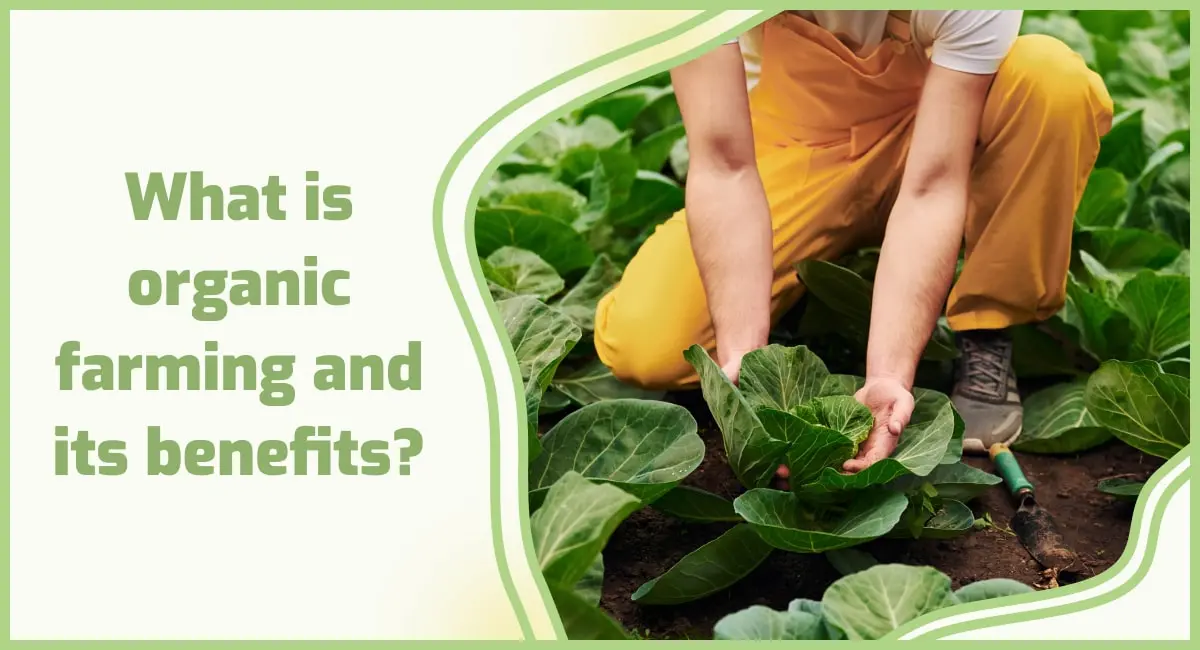
Practical benefits of organic gardening
Organic gardening presents practical benefits that elevate the act of gardening into a comprehensive lifestyle choice, integrating taste, quality, and sustainability. As we’ve traversed the spectrum of ecological, economic, and societal implications, the practical facets of organic gardening manifest through the enhancement of produce flavor and sustainability practices. These offer not only immediate gratification to gardeners in the form of delicious produce but ensure that the legacy of organic principles endures, enriching the lives of future generations and fostering a harmonious relationship with the earth.
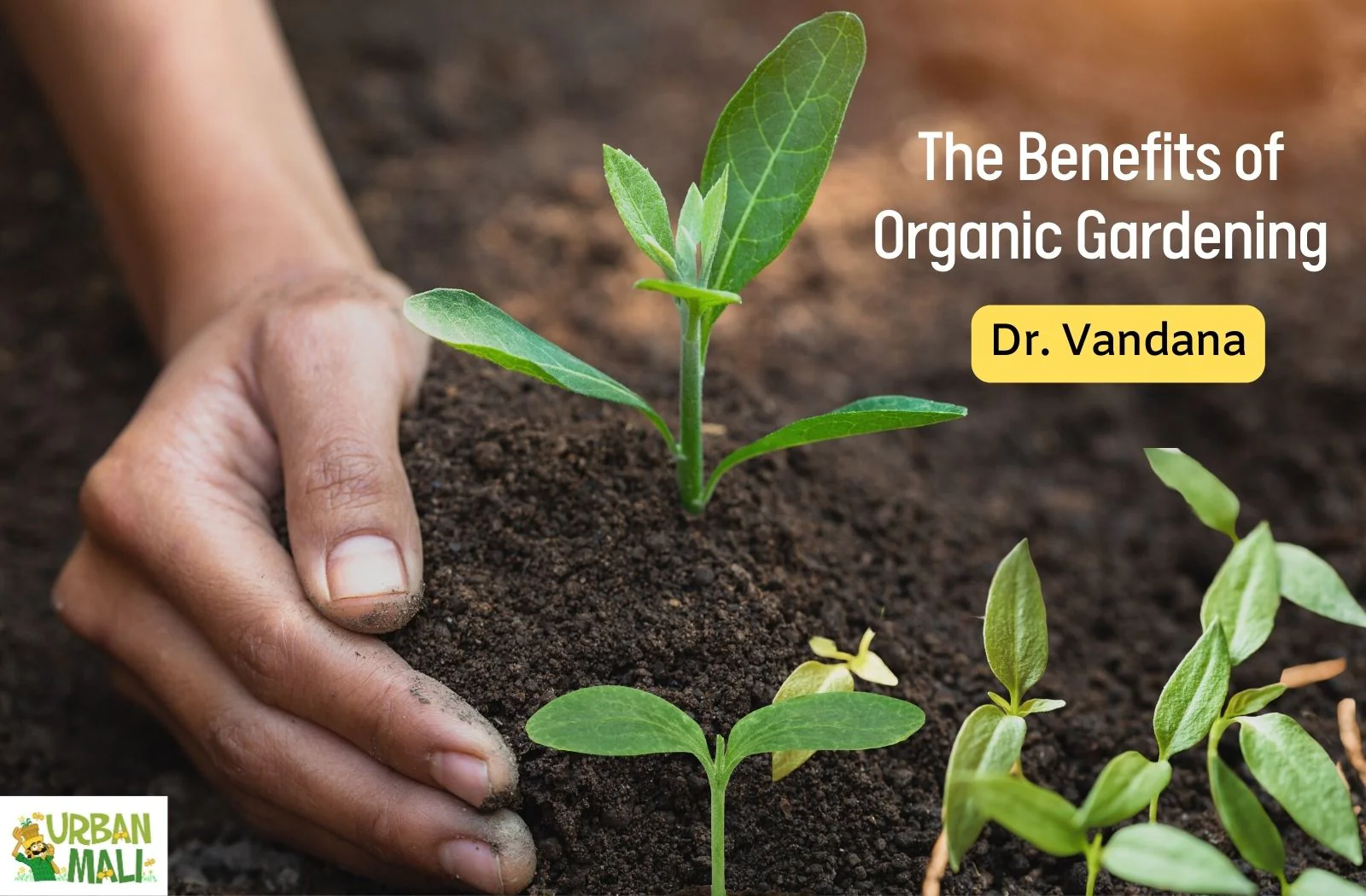
Enhanced flavor and quality of produce
One of the most celebrated benefits of organic gardening is the unparalleled flavor and quality of its produce. The organic methods channel the vitality of the soil directly into the edibles, resulting in foods that not only look vibrant but taste sensational, awakening the palate with layers of authentic and complex flavors often absent in conventionally farmed foods.
The journey from seed to harvest in an organic garden is an intricate dance of natural elements, leaving a profound impact on both the nutrient profile and flavor of the produce. Without the interference of synthetic pesticides and fertilizers, plants develop their intrinsic defenses, enriching their flavor compounds as a result. This process yields fruits and vegetables that embody the essence of their terroir similar to wine, organic produce captures the taste of its environment.
Key elements contributing to enhanced flavor include:
- Nutrient-rich soil, fortified through composting, which enhances root nutrient uptake.
- Slow-growing, naturally ripened produce that develops deeper flavor profiles.
- Absence of chemical residues that might mask or alter natural flavors.
Perhaps nothing speaks more to the soul of a gardener than biting into a carrot pulled straight from the soil, tasting the sweetness that only the earth’s loving embrace can produce. The depth and complexity of organic flavors redefine culinary experiences, reminding us of food’s inherent potential when grown naturally.
The essence of organic gardening is captured in the flavor of its harvest, a testament to the quality and care that nurturing the land with organic principles brings. Here, gardening becomes more than a hobby; it becomes a celebration of life where each meal sings of the garden’s bounty, rewarding the gardener for their labor and choices.
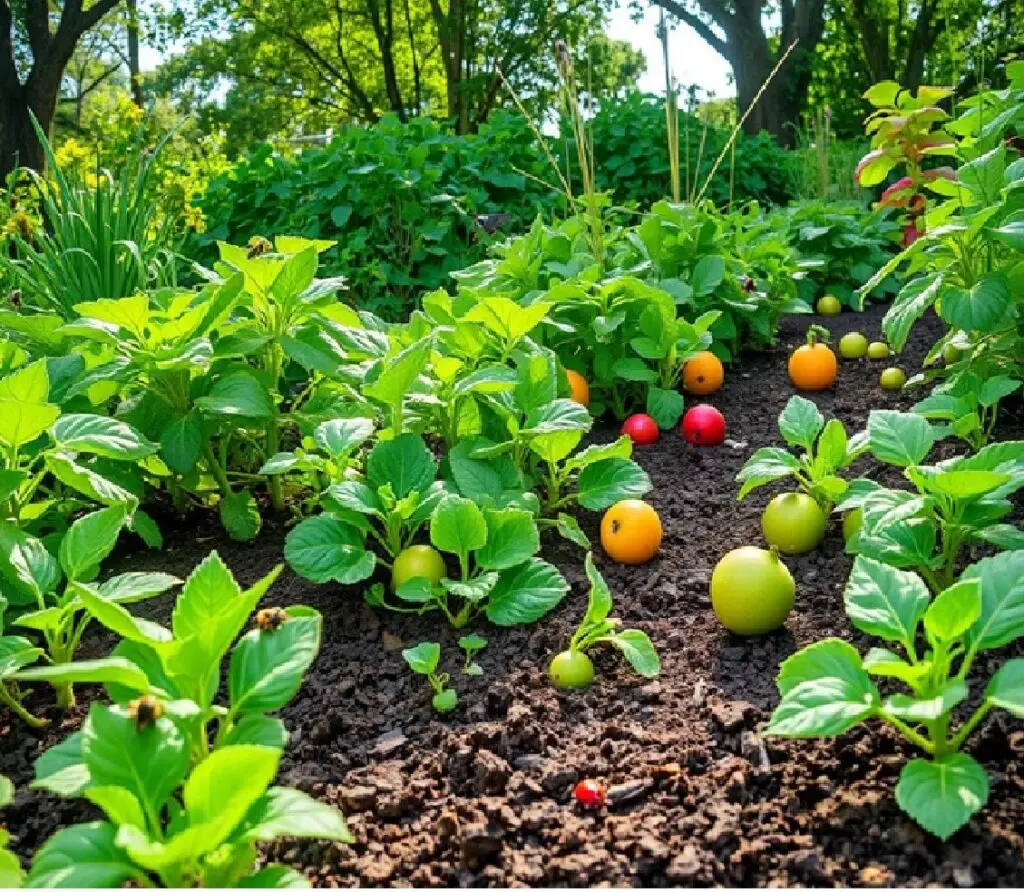
Sustainable gardening practices for future generations
The principles of organic gardening stretch far beyond the present moment, seeding sustainability for future generations. By embracing natural cycles and grounding practices in ecological mindfulness, organic gardening lays a foundation for enduring agricultural systems. It is a clarion call for future-focused cultivation that respects both the planet’s needs and mankind’s future.
Central to this sustainability is the concept of self-sufficiency, where gardens become ecosystems that recycle their waste, enrich their soil, and sustain their productivity through natural processes. Techniques such as composting and permaculture actively regenerate the land, emphasizing a cyclical relationship between harvest and replenishment.
Sustainable methods include:
- Crop rotation to protect against soil depletion and pest proliferation.
- Cultivating diversity to maintain ecosystem resilience.
- Implementing permaculture design principles that enhance biodiversity and resource management.
By fostering practices that mitigate climate change impacts and reduce environmental footprints, organic gardening instructs future stewards of the land in how to preserve and cherish our agricultural heritage. This nurturing approach to the earth speaks to the cultivation of a profound legacy that envisions a world where food security is assured not by technological advents but by aligning human activities with natural processes.
In planting organic seeds today, gardeners sow promise for tomorrow, propagating a vision of green abundance and ecological harmony. Organic gardening frames an enduring narrative one where the legacy of stewardship serves as a guiding compass pointing toward a future flourishing in balance and biospheric health, gifting future generations a world where nature and humanity thrive as one.
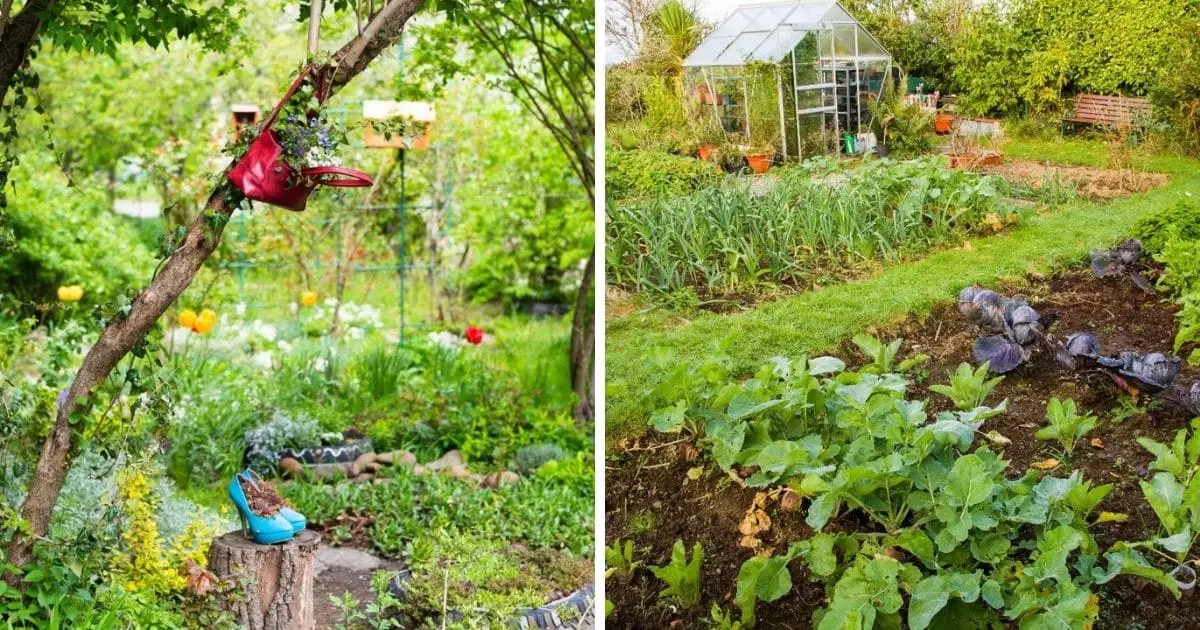
FAQs
- Why is organic gardening better for the environment? Organic gardening reduces pollution by avoiding synthetic chemicals, promotes biodiversity, and supports sustainable practices that maintain ecosystem balance.
- Does organic gardening improve mental health? Yes, it provides stress relief and improves mood by fostering a connection with nature and offering mindfulness through gardening activities.
- How does organic gardening save money? It reduces grocery bills by growing produce at home and avoids the premium costs associated with buying organic produce from stores.
- What makes organic produce tastier? Organic produce develop richer flavors and higher nutrient content as plants grow naturally without chemical interference.
- How does organic gardening support future generations? It emphasizes sustainable practices such as crop rotation and biodiversity, ensuring a resilient and productive ecosystem for the future.
Conclusion
In weaving this narrative of organic gardening, a multifaceted tapestry emerges, unfurling benefits that extend across personal health, economic gain, and planetary well-being. From the soil underfoot to the communities that grow together, organic gardening represents both an ethos and a pragmatic approach to a sustainable, healthy lifestyle. It promises a reunion with the natural world, where ecological principles guide cultivation practices, allowing life to flourish in harmony with nature’s wisdom. As individuals and communities embrace this green path, the promise of health, abundance, and sustainability waits. Herein lies the essence of organic gardening a lifetime commitment to nurturing the earth while nurturing ourselves, ensuring a legacy for future generations to inherit, cultivate, and cherish.
